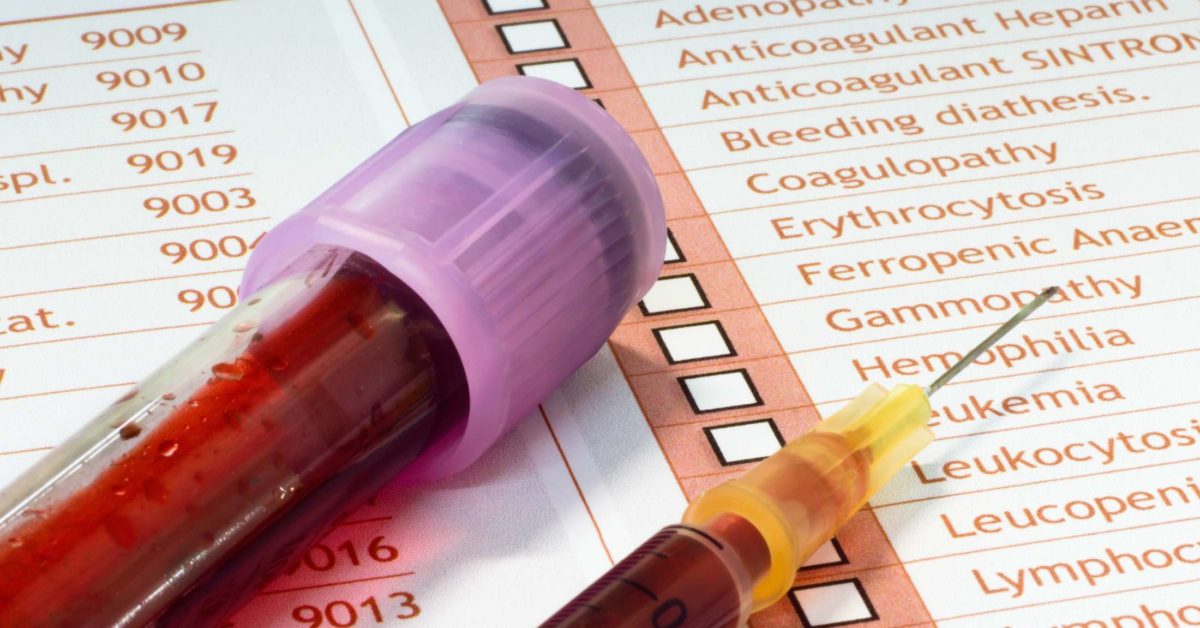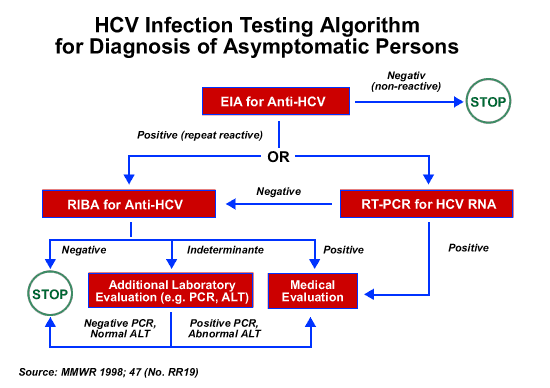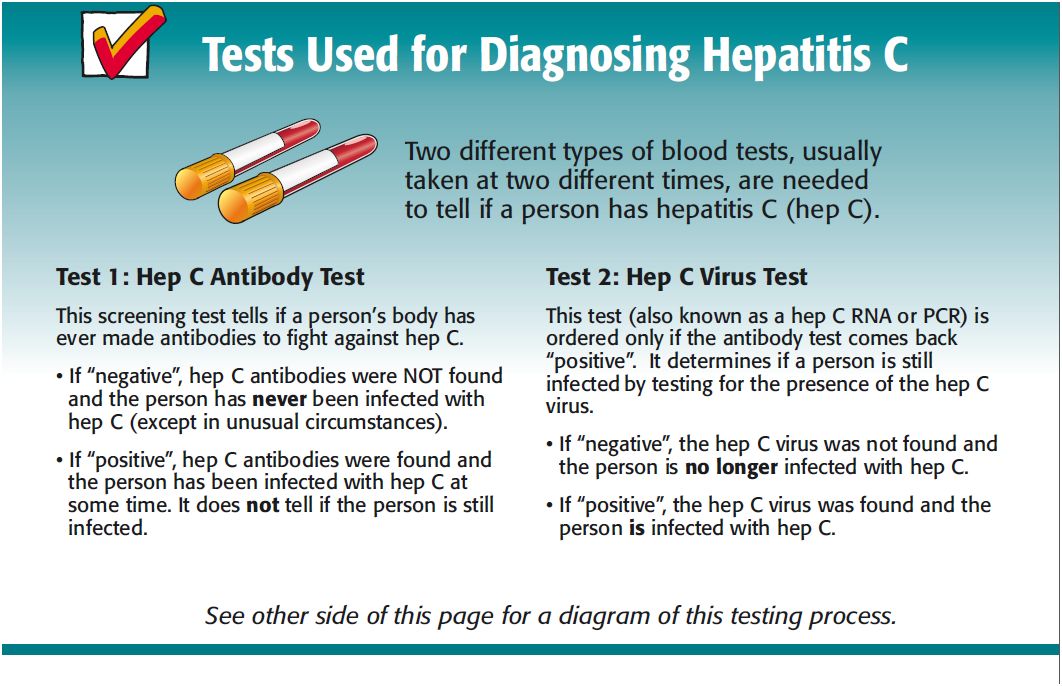What Does The Test Measure
Hepatitis C testing identifies antibodies to the hepatitis C virus, detects viral RNA, and/or determines the strain of hepatitis C. Hepatitis C testing may involve several different tests:
- Hepatitis C antibody test: Antibodies are a part of the bodys response to an infection. Testing for hepatitis C antibodies determines whether or not a patient has been exposed to the hepatitis C virus at some point in their life. If this test is positive, the next step is to test for hepatitis C RNA which can tell you if you have a current infection.
- Hepatitis C RNA test: RNA is a type of genetic material from the hepatitis C virus that can be detected in the blood. If test results are positive after a hepatitis C antibody test, doctors use a hepatitis C RNA test to look for and/or measure the amount of the virus in the blood. Qualitative HCV RNA tests can detect the presence of HCV RNA, while quantitative HCV RNA tests measure the amount of HCV RNA. Understanding the amount of HCV in the blood helps to monitor response to treatment.
- Genotype test: There are at least six types of hepatitis C, which are also called strains or genotypes. Treatment for hepatitis C depends on the strain, so genotype testing to guide treatment is performed in patients who are diagnosed with an HCV infection.
Hepatitis C Viral Load / Hcv Rna Quantitative Testing
Hepatitis C
The viral load of hepatitis C refers to the amount of virus present in the bloodstream. The quantitative HCV RNA tests measure the amount of hepatitis C virus in the blood. The result will be an exact number, such as “1,215,422 IU/L.” Many people refer to the quantitative measurement as the hepatitis C “viral load.”
Viral load tests are used to confirm active hepatitis C infection and are used during treatment to help determine response. If you have lower levels of virus in your blood when you start treatment, you may have a better chance of getting rid of the virus.
Questions For Your Doctor About Test Results
Patients receiving hepatitis C testing may find it helpful to ask questions about their test results. Questions to consider include:
- What type of hepatitis C test did I receive?
- What was my test result?
- How do you interpret the results of the hepatitis C tests that I had?
- Do I need any follow-up tests based on my test result?
Read Also: How Can I Get Hepatitis
Are There Supplements That Are Good For My Liver
If a person eats a balanced diet, they will normally get enough vitamins and minerals. People with liver disease should avoid taking large amounts of supplements or “mega-vitamins.” This is because the liver has to do extra work to process them. Your provider may put you on a general multivitamin without iron.
Staying Healthy With Hepatitis

Not everyone needs treatment right away, but its important to be monitored regularly by an experienced doctor and discuss treatment options of the best way to keep you healthy.
- Get vaccinated against Hepatitis A and Hepatitis B
- Avoid alcohol and drugs
- Eat a healthy & balanced diet. Include a lot of vegetables and fruits try to stay away from too much salt, sugar and fat.
- Exercise regularly. Walking is one of the best exercises, and it helps to make you feel less tired.
- Check with a health professional before taking any prescription pills, supplements, or over-the-counter medications.
- Do not share razors, nail clippers, needles or other items that come in contact with blood with other people.
Don’t Miss: Hepatitis C Outside The Body
How Often Do I Need A Viral Load Test
Understanding the specifics of your viral load is important at the time of diagnosis. Once you begin treatment, follow-up testing will let your doctor know if the current treatment is effective.
Other than that, theres no need for repeat testing. This is because the viral load doesnt provide information about your symptoms or whether your liver is functioning properly. Other liver tests, such as a biopsy, can provide that information.
Certain groups are more vulnerable to contracting HCV. Among them are:
- people on dialysis
- children born to HCV-positive mothers
- anyone who may have had contact with the blood of someone with hepatitis C
The most common methods of HCV transmission are:
- sharing needles and syringes used for injecting drugs
- a mother with hepatitis C transferring HCV to her child during childbirth
Occasionally HCV is transmitted through:
- having sex with someone who has hepatitis C
- getting a tattoo in a place that doesnt have good infection control
- sharing personal care items, such as a razor or toothbrush, with someone who has hepatitis C
Hepatitis C cant be transmitted through:
- coughing or sneezing
How Is Hepatitis C Spread Will My Loved Ones Catch It From Me
Household transmission of hepatitis C is extremely rare. Here are some ways the virus is transmitted:
The number one risk factor for infection and transmission is sharing needles for intravenous drug use. Most people who use IV drugs become infected with HCV within one year of sharing needles. Learn more.
Don’t Miss: Hepatitis C Effects On Liver
Who Can Be Treated For Hepatitis C
Treatment decisions should be made by both you and your provider. Current treatments for hepatitis C are very successful and can cure most people of the virus.
What The Qualitative Results Mean
The qualitative results indicate that HCV is present in your blood. The test result will be either detected or undetected.
Detected means that you do have the virus in your blood. Undetected means that you dont have the virus in your blood, or you have a tiny amount that cant be detected by this test.
The qualitative test results may still be positive even if your viral load has decreased drastically due to treatment.
Read Also: Is A Vaccine Available For Hepatitis B
What Is The Difference Between Hepatitis B Surface Antibody And Antigen
An antigen is a substance that induces antibody production. Hepatitis B surface antigen is a protein on the surface of hepatitis B virus.
Hepatitis B surface antibodies are produced by the bodys immune system in response to HBsAg. The presence of adequate hepatitis B surface antibodies in the blood indicates protection against hepatitis B virus infection.
Negative But Other Hepatitis Tests Are Positive
Your HBsAb test may be negative even when other hepatitis B tests are positive, showing active or chronic infection. Further testing is necessary, especially for the hepatitis B surface antigen , which shows that the virus itself is circulating in your bloodstream and that you have an active or chronic infection.
Recommended Reading: How Much Is A Hepatitis C Test
Explanation Of Test Results:
If this test result is positive, it means your body was exposed to the hepatitis C virus and made antibodies . However, it does not tell you whether you are still infected with hepatitis C. If the antibody test result is positive, you should be tested for hepatitis C RNA , which determines whether you are chronically infected. The lab will perform this RNA test automatically if your hepatitis C antibody test is positive.
If the antibody test result is negative, it means you have not been infected with the hepatitis C virus, and further testing for hepatitis C usually is not needed.
How Can I Make A Difference For People With Hepatitis C

Anyone can help raise awareness about this widespread disease. Citizens can write letters to their state representatives or local newspapers and get involved in volunteer efforts with liver disease or Veteran-affiliated organizations . Speaking at support groups and sharing your experience is also a good way to help others with HCV.
Read Also: What Is Hepatitis B And How Do You Get It
How Common Is Hepatitis C
The Centers for Disease Control and Prevention think that 2.4 million Americans are infected with HCV. It is the most common infection carried by blood in the United States. Veterans have higher rates of hepatitis C than the rest of the country so it is especially important to discuss hepatitis C testing with your provider if you are a Veteran. But, Veterans are not the only ones with high rates of hepatitis C. Baby boomers have higher rates of hepatitis C than people in other age groups in the country as well. Often, people infected with hepatitis C are not aware of their infection because they have no symptoms and they do not feel ill so getting tested if you are at higher risk is important step.
Question 9 Why Are Hcv Rna Results Being Reported In Iu/ml What Does Log Iu/ml Mean
HCV RNA results are reported in IU/mL, which is the abbreviation for international units per milliliter. Results are reported in IU/mL to facilitate comparisons between results generated by different test methods. This is important because the various methods used by different laboratories are not standardized against each other. Use of IU/mL reporting units helps to make the comparison of viral load results across different methods more reliable.
HCV RNA results are also reported in log IU/mL, which is the logarithm of IU/mL. Results in this format make it easier to understand whether a change in viral load is clinically meaningful.
Replicating PCR test results using the same specimen can vary analytically by as much as 0.5 log IU/mL thus, only changes greater than 0.5 log IU/mL from one measurement to the next are considered to represent true changes in viral load.8 Reporting the viral load results in log IU/mL units helps the healthcare provider accurately interpret changes in viral load and better assess a patient’s response to antiviral treatment.
Don’t Miss: How Does One Get Hepatitis B And C
Tests After The Diagnosis
Once the doctor knows you have hep C, theyâll do tests to find out more about your condition. This will help determine your treatment. They could include:
- Genotype tests to find out which of the six kinds of hepatitis C you have.
- Liver function tests. They measure proteins and enzymes levels, which usually rise 7 to 8 weeks after youâre infected. As your liver gets damaged, enzymes leak into your bloodstream. But you can have normal enzyme levels and still have hepatitis C.
- Tests to check for liver damage. You might get:
- Elastography. Doctors use a special ultrasound machine to feel how stiff your liver is.
- Liver biopsy. The doctor inserts a needle into your liver to take a tiny piece to examine in the lab.
- Imaging tests. These use various methods to take pictures or show images of your insides. They include:
What Does A Reactive Hcv Antibody Test Result Mean
A reactive or positive antibody test means you have been infected with the hepatitis C virus at some point in time.
Once people have been infected, they will always have antibodies in their blood. This is true if they have cleared the virus, have been cured, or still have the virus in their blood.
A reactive antibody test does not necessarily mean that you currently have hepatitis C and a follow-up test is needed.
Recommended Reading: How To Treat Hepatitis B Virus
I Have Hepatitis C And I’m Thinking About Having Children What Should I Know
Hepatitis C does not prevent a man or woman from having children.
The hepatitis C virus infection does not cause infertility in either sex–it does not affect a woman’s ovarian or uterine function, or a man’s sperm production or sperm characteristics.
If you are a woman with hepatitis C, talk to your provider about treatment before pregnancy. Treatment before pregnancy can help reduce the risk of hepatitis C transmission to your baby. If you are already pregnant, treatment will usually take place after pregnancy and you may need to be tested for hepatitis C again prior to starting treatment.
If you are a man with hepatitis C, talk to your provider about being treated prior to conceiving. Although the risk of transmission during sex is low, it is still important to treat hepatitis C for your personal health.
How Hepatitis C Is Diagnosed
To determine a hepatitis C diagnosis, your doctor will:
- Get your medical history .
- Perform a physical exam, especially checking for changes in skin color, swelling in your lower extremities, and tenderness in your abdomen.
- Order certain diagnostic blood tests.
The first diagnostic tool in the screening process is a blood test that screens for HCV antibodies proteins the body produces in response to the virus. An enzyme immunoassay is used to perform this test.
A negative result for the antibody test means that you’ve never had HCV in your blood, while a positive result means you were exposed to the virus at some point in your life. Up to a quarter of people spontaneously clear the virus from their blood within six months of contracting it.
Because EIA sometimes produces false-positive results, a test called recombinant immunoblot assay may be used to confirm that you have the HCV antibody. This test is not necessary for most patients, and it is more commonly performed by blood banks to check for the virus in donated blood.
A negative EIA result may just mean that your body has not yet produced the HCV antibody , and you may need to be tested again in a few months.
If you have a positive antibody test, your doctor will then use another blood sample to conduct a qualitative polymerase chain reaction test or a process called transcription-mediated amplification , which looks for the presence or absence of RNA of HCV in your blood.
You May Like: What Does Hepatitis Rash Look Like
What Are Genotypes And What Do They Mean
Viruses have genes, too. The genotype of virus you have can be one of six different groups, or genotypes. Most patients with hepatitis C in the United States have genotype 1a or 1b, but in other parts of the world, other genotypes are more common.
There isn’t a “better” or “worse” genotype to have. In the past , genotype 1 was the most difficult to successfully cure but this is no longer the case. All the new direct-acting antiviral medicines work extremely well in treating all genotypes. Sometimes genotype 3 is a little harder to cure, but in general, all genotypes now have extremely high likelihoods of being cured with hepatitis C treatment.
What Is The Difference Between Relapse And Nonresponse

The goal of treating chronic hepatitis C is to completely clear the virus. This means that your “viral load” is zero or so low that the virus can’t be detected with standard blood tests.
Without treatment, the hepatitis C virus in liver cells constantly makes copies of itself, and the virus ends up not just in liver cells but also in the bloodstream. Treatment is intended to completely stop reproduction of the virus so that it doesn’t continue to enter the bloodstream or cause any more injury to liver cells.
Successful treatment results in a “sustained virological response.” This means the virus becomes completely undetectable before the treatment is finished, and it remains undetectable for 6 months after treatment is stopped.
A “relapse” means the viral load drops to an undetectable level before treatment is completed, but becomes detectable again within 6 months after treatment is stopped. Even if the virus returns at a level that is lower than it was before treatment, a relapse is still considered to have occurred. A relapse can be determined if the viral load starts to rise during treatment, or at any time after the virus becomes undetectable.
A “nonresponse” means the viral load never drops significantly and the virus remains detectable throughout the course of treatment.
Don’t Miss: What Does It Mean If You Have Hepatitis C Antibodies
What Does A Hepatitis Panel Involve
Hepatitis panels are simple blood tests. They do not involve any preparation and have a very low risk of side effects.
To perform the test, a healthcare professional will insert a needle into a vein in the arm. They will collect a small blood sample in a test tube and seal it. The needle may sting a little, but the process takes only a few minutes. A person may feel a small amount of pain or bruising around the vein, but this should subside quickly.
People can also get at-home testing kits for hepatitis. These come with a sterile lancet that a person uses to prick their finger to collect the blood sample.
When using at-home kits, be sure to take safety precautions to prevent others from coming into contact with blood. Even dry blood or tiny amounts of blood can potentially transmit HBV or HCV to others.
Dispose of items that come into contact with blood in a sealed bag and wash the blood from the skin using soap. Completely cover the finger prick wound with a sterile dressing until it heals.
- of the population have hepatitis B and have not had a vaccination
- spent time in a facility that had a hepatitis outbreak, such as a hospital or prison
- received a blood transfusion that did not undergo hepatitis screening
In the United States, screening eliminated HCV from donated blood in 1992. People who received blood transfusions before 1992 should ask their doctor for a hepatitis C test.